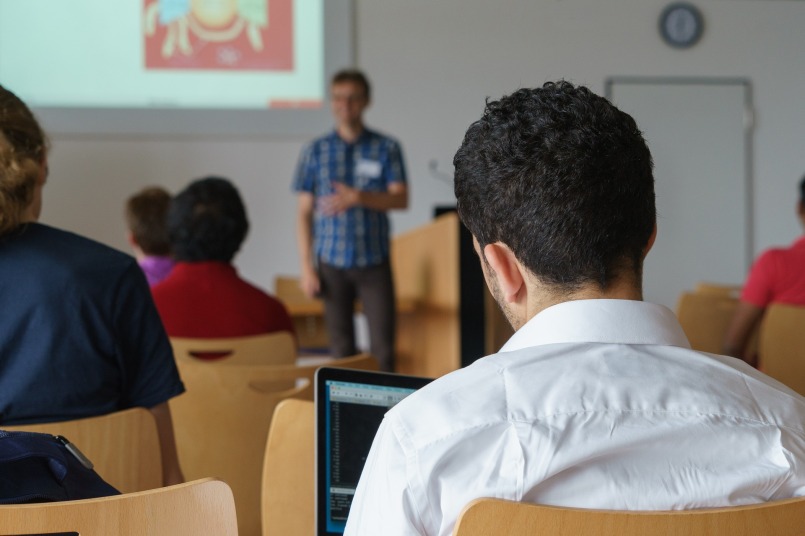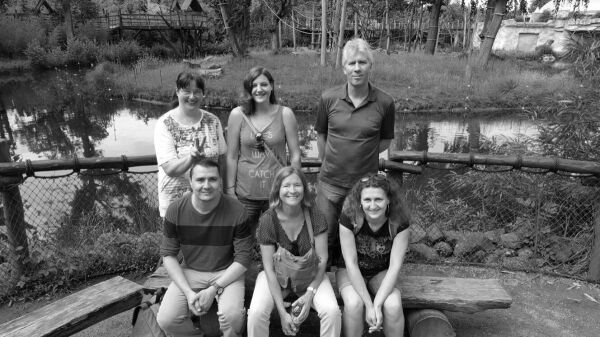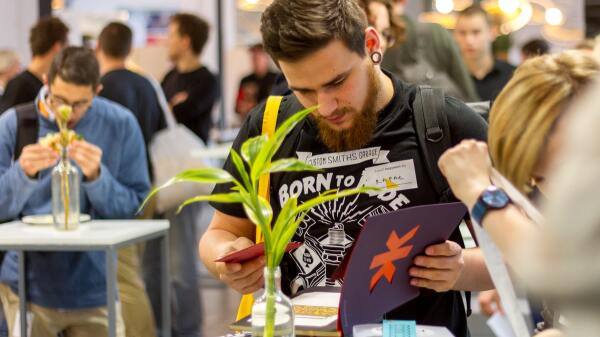M.Sc. NanoEngineering
Study period
4 semesters (2 years)
Credits
120
Study begin
Winter and summer semester
Study place
Campus Duisburg
Language
German
Description
Nanotechnology in general is the production and use of structures that are smaller than 100 nm in at least one dimension. The field of nanoscience has developed in the last 25 years in an extraordinarily dynamic and interdisciplinary way. Nanoscience is one of the key technologies of the 21st century. However, its extensive application potential can only be exploited economically if the "nanoeffects" discovered in basic research are translated into industrial products. This is the task of an engineer!
The 4-semester Master's programme is designed to deepen the qualifications acquired in the Bachelor's programme of the same name and, in addition, to impart skills used to not only apply scientific methods in the field of nanotechnology to complex problems, but also to analyse and further develop them.
Depending on the choice of specialisation, there is a pronounced focus on one of the application areas of nanoprocess technology or nano(opto)electronics. A subsequent doctorate to Dr.-Ing. or Dr. rer. nat. is possible. Excellent job market opportunities await the successful graduates. According to expert estimates, nanotechnological components or processes will be used in all branches of industry in the future. Worldwide, about two million experts will be needed in this field in the next ten to 15 years. The most important areas here are electronics, chemistry, automotive engineering, the optical industry and health care.
Study at UDEInformation about the degree program
Study plan
Study plan
You can find the examination regulations for your study program here: Examination regulations according to study programs
Study plans as well as information about the modules in the study program can be found in the module handbook:
Module handbook: M.Sc. NanoEngineering
Information material
Prospective students will find an overview of the study program here and a section of frequently asked questions.
Current information related to exams and other important topics can be found here.
Further information on the Master NanoEngineering can be found at: Master programme NanoEngineering.
Study plans as well as information about the modules in the study program can be found in the module handbook: M.Sc. NanoEngineering
Admission
Admission requirements
The prerequisite for admission to the Master's programme NanoEngineering is the successful completion of
- Bachelor's programme NanoEngineering at the University of Duisburg-Essen
or
- an equivalent degree programme in the fields of engineering or natural sciences
as well as a qualification related to the course of study.
In addition, the applicant must demonstrate the following specific knowledge depending on the chosen specialization:
- For the specialization Nano electronics / Nano optoelectronics knowledge in the field of mathematical/scientific basics amounting to 30 ECTS, knowledge in the field of material sciences / nanotechnology amounting to 20 ECTS, knowledge in the field of electrical engineering and information technology amounting to 10 ECTS.
- For the specialization Nanoprocess Technology Mathematical/scientific basics to the extent of 30 ECTS, knowledge in the field of material sciences / nanotechnology to the extent of 20 ECTS, knowledge in the field of mechanical engineering / process technology to the extent of 10 ECTS.
The determination of the equivalence of the degree programme and the decision on exceptions is made by the examination board. The examination board may also grant admission subject to conditions.
Admission
Unrestricted admission (study places are not limited)
Enrollment takes place during the enrollment period at the student register's office on the Duisburg Campus.
Prospective students from non-EU countries should apply to the International Office on the Duisburg Campus.
Language Skills
The language of instruction at the University of Duisburg-Essen is German (except in the English-language programs). Therefore, you must have good German language skills if you want to study successfully. The majority of foreign applicants must pass the "Deutsche Sprachprüfung für den Hochschulzugang" (DSH 2 level; with some exceptions) before beginning their studies.
- German nationals (persons who have acquired their higher education entrance qualification in Germany or at a German school abroad) do not require any special proof of German language skills.
- Citizens of an EU member state (and citizens of Iceland, Liechtenstein, Norway) or German citizens with a foreign educational qualification, as well as
- Citizens of a country outside the EU with a foreign university entrance qualification must pass the "Deutsche Sprachprüfung für den Hochschulzugang" (DSH 2 level) or the TestDaF (TDN 4) before the begin of their studies.
Information on the German Language Test for University Entrance (DSH)
Further language skills
In the international environment of nanotechnology, English plays an increasing role as an international technical language. The aim of the study programme is therefore also to convey a familiarity with the English technical language through the use of the English language in selected courses. Appropriate language skills are therefore expected from the second year of study onwards.
Internships during studies
Not compulsory. However, it is recommended to use lecture and examination-free periods for a stay abroad.
Study abroad
A study abroad can be easily integrated into your degree program. With a wide range of international exchange programs, you can spend one or more semesters abroad without extending your studies.
Your planned courses and academic achievements are coordinated with your faculty in advance, ensuring that the credits you earn abroad can be easily recognized. Many students take this opportunity to gain international experience and new perspectives for their studies and future career.
Your exchange opportunities:
- Europe: through ERASMUS+ and Aurora partner universities, e.g., in Italy, Spain, Austria, France, Finland, Turkey, and many other countries.
- Asia: Our exchange program with two partner universities in Southeast Asia is particularly attractive, including Universiti Kebangsaan Malaysia (UKM) and Universitas Indonesia (UI).
- Worldwide: our faculty maintains numerous cooperation programs worldwide – from Brazil and Mexico to South Korea, Taiwan, Japan, and many other countries.
Further information:
https://www.uni-due.de/iw/en/international/fiw
General Information
Living & Studying at the University of Duisburg-Essen

Semester
The academic year is divided into semesters.
- Winter semester: from October to March
- Summer semester: from April to September

Lecture period
The winter lecture period usually starts in mid-October and ends in mid-February. In summer, the lecture period usually starts in mid-April and ends in July. During the winter semester there is a break of about two weeks during the Christmas holidays.

Examination phase
The examination phase begins about one week after the end of the lecture period and lasts about seven weeks.
Semester fee
All students have to pay a semester fee (social contribution) of about 320,- Euro per semester. You can find the current amount here. The social contribution includes, among other things, a semester ticket for public transportation in North Rhine-Westphalia and discounts on meals in the university's canteen and cafeteria.
Living expenses
We recommend to consider approximately 800 to 1000 Euro of personal expenses per month.
Accommodation
Accommodation is possible in dormitories of the Studierendenwerk and in premises of the free housing market. The rent in a room in a student dormitory is about 300,- Euro per month. You can find more information about housing options here.
Introduction of the institutes
Contact
You have questions? We have answers!

Support Center for (International) Engineering Students Student advisory service
SG 119
Geibelstr. 41
47057 Duisburg
Tel.: +49 (0)203 379 3776
E-mail: scies@uni-due.de

Student council NanoEngineering
We are your point of contact! If you have questions about your studies or general concerns about us or our lecturers, you can contact us. We will solve your problems and answer your questions directly if possible or forward you to the right people. Just write us an email (fsr-nanoengineering@uni-due.de) or contact us via Facebook.
For prospective students and enrolled students General student counseling
ABZ offers counseling to prospective students, enrolled students and graduates on all questions concerning the choice of study program, studies and the transition into working career.
Support in the Faculty
Dr.-Ing. Wolfgang Mertin (Materials in electrical engineering)
Room BA 111, Tel. 0203/37-93407
Opening hours: by appointment
Prof. Dr. Marika Schleberger (Physics)
Room MC 365, Tel. 0203/37-91600
Opening hours: by appointment
Board of examiners
Chairman
Prof. Gerd Bacher
Vice chairman
Prof. Markus Winterer













